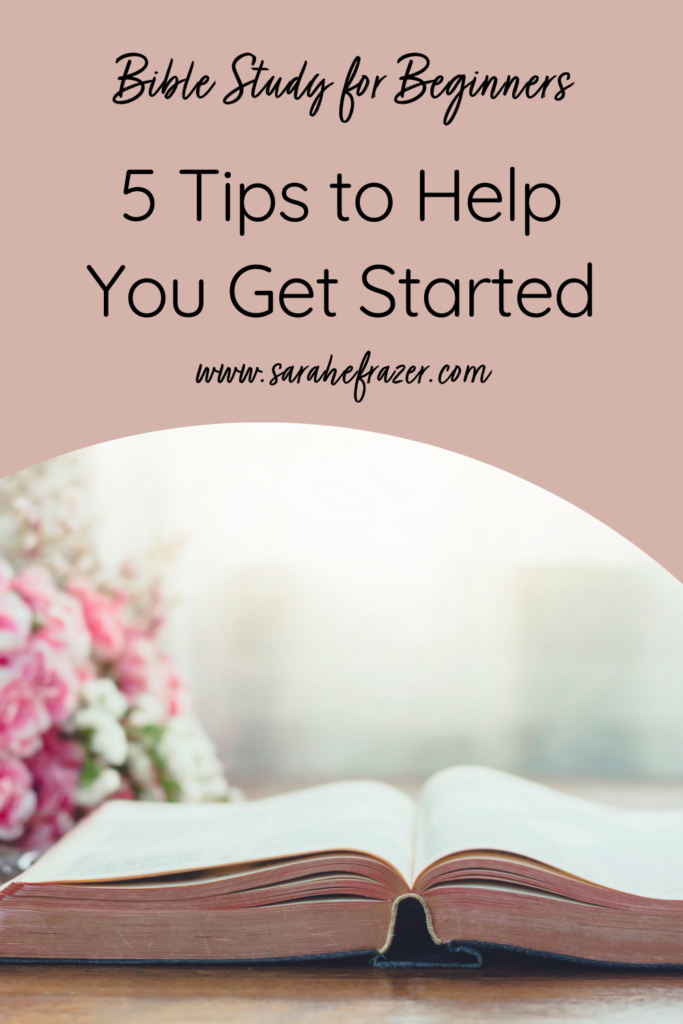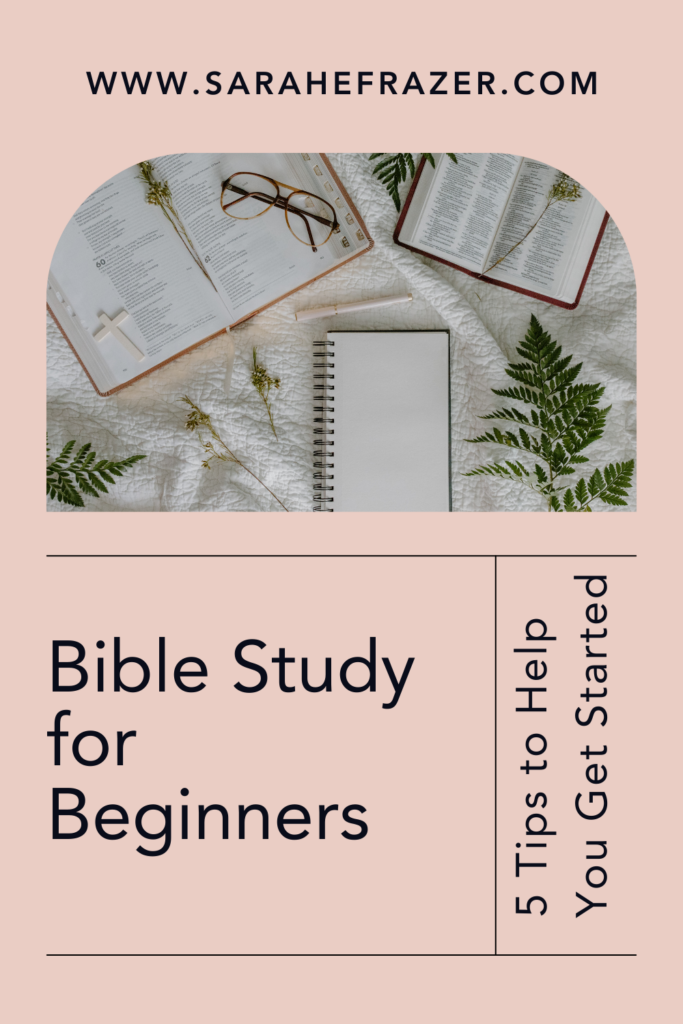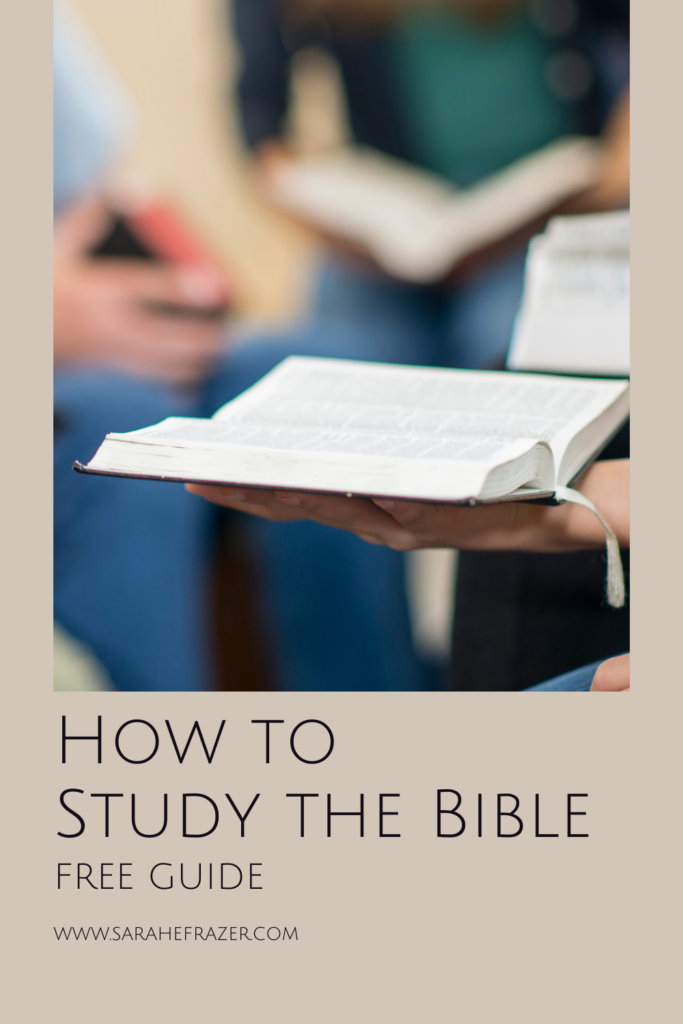Bible Study for Beginners – 5 Tips to Help You Get Started

Bible Study for Beginners – 5 Tips to Help You Get Started
I’ll never forget the Sunday I went to church and realized my Bible had stayed in the car all week. The shame and guilt I felt pierced my soul. When the preacher encouraged us to read and study during the week I always used to feel so lost. I didn’t even know how to begin to study the Bible.
Maybe you’ve felt similar feelings when it comes to Bible study. For me, I had been a Christian most of my life but never really learned how to study the Bible. Yes, I could read a Bible study and attend Bible studies.

Studying the Bible on my own felt so daunting. I didn’t really believe I was smart enough or had enough time in my life to devote to studying. There was no class on Bible study for beginners.
In the middle of a very busy season, I had four children under the age of six, I was desperate. I didn’t have time to go to the Bible study at my church. I was struggling with depression and anxiety. We had just adopted our youngest daughter from China.
It was during one morning years ago I realized that I needed God’s word in my life. So I began. The journey to learning how to study the Bible has been long and hard. That was almost ten years ago.
Since then I’ve tried many methods, mentored many women, and stopped and started more times than I can count. I am more convinced than ever that Bible study is not only doable for busy, overwhelmed women – Bible study is a lifeline for us!

It’s Okay to Be a Beginner
One of the first hurdles I had to overcome was this idea that I was a beginner. There is nothing wrong with being a beginner. The best thing you can do is start! You are not “behind” or “too – old, young, busy, tired, unintelligent.” Those are all lies and today you can put away those lies, like I did, and start.
All of us learn differently and if you were to do a Google search on “how to study the Bible” you would find thousands of results. I’d like to share with you how to study the Bible for beginners. These five steps are not only great for beginners, but also can be used if you haven’t studied your Bible in a long time.
Bible Study for Beginners – 5 Steps to Help You Get Started
Start With Something Familiar
1. Pick a passage in the Bible that you are somewhat familiar with. Maybe start with a book like John or Genesis. Mark is also a great book to start in. Choose something that you are also interested in. For example, maybe you want to study the Book of Psalms. Wherever you pick to read it is usually a good idea to stick to one book of the Bible at a time.
Observation
2. Observation: What do you see? Use some of these questions to help you figure out what the text is saying. This step will take the longest. What is the genre of this book? Who is the author? Who is he speaking to? Is this an Old Testament or New Testament book? The internet has lots of great (FREE) resources you can use to answer some of these questions. Who is speaking in this passage? What are they doing? Where is God in these verses? Is this a command, a promise, a statement, or something else? Write down your answers to those questions, but also what questions do you have? What doesn’t make sense and what would you like to know more about? That way you can look up the answers. Use the free online tools listed below to find some of those answers. You can always ask your pastor as well. (Keep reading for free online Bible tools you can start using today!)
Interpretation
3. Interpretation: What does it mean? This is where you might use those free online Bible tools because sometimes the passage is clear as to what it means. When God says, “Love your neighbor.” That’s pretty straightforward! But there are times when the Bible might not be easily understood. Using commentary, online Bible tools, and more can help you figure out what the Bible is saying. Don’t get stuck on this step. Remember, the best question to ask yourself when it comes to interpretation is “What ddid this passage mean for the original audience?” If you can figure that out it helps with the next step.
Application and Prayer
4. Application and prayer. Use prayer as a way to open up your Bible study time and close it. I always pray that God will open my eyes (Psalm 119:18) to the truth that I need to see. I ask God to show me through the Holy Spirit (2 Corinthians 2:10) what He would like me to know. Connect with God through prayer as you read and study. As you study each day, try to take away one thing God might be teaching you. Maybe a certain verse stands out or a truth that you had forgotten. Write that application down as well.
Find a Friend
5. Find a friend. One of the best things I did when I was just starting out was to find some people to walk with me. I invited a few friends to my house and we just studied the Bible together! Click here to read how to start your own community Bible study.
Whether you are just starting out, or need to get to studying, the Bible is waiting. One of the most beautiful truths that keeps me going is that God is always waiting. I am never behind or in trouble with God because I haven’t been studying. The best thing I can do is start. You can too!

Free Online Bible Tools
gateway.com – This site serves as a search engine. You can look up a certain verse or whole chapters. They do have commentary, but the best tool is the Bible dictionary. If you come across a word you don’t know you can look it up here.
blueletterbible.org – I like this site because you can look up the Greek/Hebrew word as well as the meanings of those words.
https://www.studylight.org/commentaries/eng.html – One of the best sites for commentaries. You can look up a passage in the Bible or you can look up the author. I have found some great answers to questions I’ve had from this website.
(insert image of workbook from this landing page:
Download this free “How to Study the Bible” guide today! In it you will find the answers to the following questions:
- What is the big picture of the Bible?
- What are the genres of the Bible?
- Where should I start reading the Bible?
- What questions should I ask?

